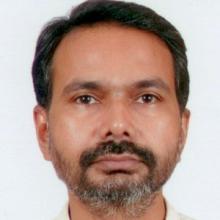11 Nov Kalpana Stories – Dr. G. Nagarjuna
“Our country needs more producers than consumers!” says Associate Professor. G Nagarjuna, Homi Bhabha Centre for Science Education, Mumbai, India. He is a STEM educator focusing on re-engineering, re-defining, and re-imagining classrooms and laboratories. A few of his amazing initiatives (visit his website for more details knowledge.org) are chaatshala.in, STEM games, Collaboratively Understanding Biology Education (CUBE). He has developed these platforms for exploring science and create a community of passionate learners. These initiatives will help them find answers to thousands of unsolved questions. A motivational place for students as well as society.

Dr. G. Nagarjuna
He said, “While India has certainly established a large number of STEM institutes and universities since independence, we see a decline in the percent contributors in leading scientific fields. Why India is not a leader in the field?” Further, he said, “Our country has become the third–largest consumer of technology. But in terms of innovations, we are lagging far behind. We are not producers, but we are becoming consumers. Where has the system failed? ”
Nagarjuna further said, “ The answer to all these questions lies in the way our school system functions and the impact it has on the developing minds of the children. Teachers and parents are focused on pressuring students to secure good grades and emphasize getting a degree from a good college. The whole aim of this kind of education is to get a job. But through this process, students lose their passion for what they like, tend to suppress creativity, and stop exploring new things”. He thinks classrooms in India have become centers helping children learning and followed by lesson plans that are mostly half delivered by the fixed mindset of teaching-learning. This whole exercise is because of syllabus limitations and the pressure to show good school results.
He fondly remembers that he was scolded and punished by his professor in the university for doodling on a notebook while attending a lecture. When he thinks about the incident now, he says, “Doodling is a way to structure your ideas and develop understanding in the way you like. Everyone has a unique way of expressing ideas, either it could be doodling, writing, painting, critical questioning, problem–solving, and so on. This has to be appreciated. These all are STEM habits. For example, doodling or drawing is a way through which you develop your ideas which are translated later into making posters or making diagrams”.
“It is not going to be a smooth transition for moving towards re-defining and re-strengthening our classrooms if certain practices by educators are not taught properly and new practices are not adopted. Certain other challenges are expected too cultural divisions, gender disparity resulting in a lesser number of women taking up the STEM fields. These are serious problems that we need to overcome”, he said. As per Nagarjuna, we need immediate changes in the system so that children develop innovative habits at an early stage like a habit of reading books, writing a journal to record and share your thoughts as we do in today’s world by writing blogs or posts to share our thoughts. These small habits will help the students to adapt to the ever-advancing STEM fields. As a science educationist, G. Nagarjuna recommends that the schools should adapt to different platforms that provide asynchronous conversations like chatshaala.in. By using a project–based education approach students will learn to work in collaboration with other people, creating a community where people come together to learn and open up their minds to the wonderful world of science. It is the need of the hour to re-engineer our education system and re-think creating a new academic environment that is inclusive of art and innovation!
Links to join and explore –
- Official Website– https://www.gnowledge.org/
- Chatshaala Community– https://chatshaala.in/
- For a more detailed interface of chatshaala and STEM Games- https://metastudio.org/
Author- Priya Butola.
Content writing team intern, VigyanShaala International.
Program Kalpana Communications Team


Sorry, the comment form is closed at this time.